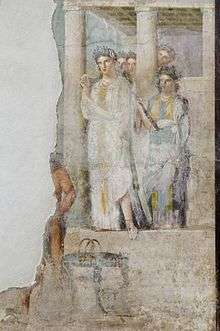Pylades

In Greek mythology, Pylades (/ˈpaɪlədiːz/; Greek: Πυλάδης) is the son of King Strophius of Phocis and of Anaxibia, who is the daughter of Atreus and sister of Agamemnon and Menelaus.[1] He is mostly known for his strong friendship with his cousin Orestes, son of Agamemnon.
Orestes and Pylades
Orestes had been sent to Phocis during his mother Clytemnestra's affair with Aegisthus. There he was raised with Pylades, and so considered him to be like a brother. While Orestes was away, Clytemnestra killed her husband, Orestes' father Agamemnon.
Death of Aegisthus and Clytemnestra
As an adult, Orestes returns to Mycenae/Argos to avenge the murder of Agamemnon. With the assistance of his friend Pylades, Orestes kills his mother Clytemnestra and her lover Aegisthus. While Pylades seems to be a very minor character, he is arguably the most vital piece of Orestes' plan to avenge his father. In The Libation Bearers, the second play of Aeschylus' trilogy The Oresteia, Pylades speaks only once. His lines come at the moment Orestes begins to falter and second-guess his decision to kill his mother. It is Pylades who convinces Orestes to follow through with his plan for revenge and carry out the murder. The significance of Pylades' lines has invited speculation into whether or not he might represent something more than human next to Orestes; he might play the role of divine encouragement or fate.[2]
In other versions of the revenge of Orestes and Electra (the Electra of Sophocles and the Electra of Euripides), Pylades accompanies Orestes, but does not speak. In the Sophocles version, Orestes pretends to be dead and Pylades carries the urn supposedly holding his friend's remains.

Attempted murder of Helen
Pylades returned to his homeland, but was exiled by his father for taking part in the crime. He then returned to Orestes' side, where he helped him to come up with a plan to avoid execution. They attempted to murder Helen, wife of Orestes' uncle Menelaus, after he proved to be of no help in protecting Orestes. However, their attempt failed through the intervention of the gods. They then took hostage Hermione, daughter of Helen and Menelaus. Apollo arrived to settle the situation and gave them all instructions, including one for Pylades to marry Orestes' sister Electra. Many of these events are depicted in Euripides' play Orestes.
Tauris
Pylades played a major role in another of Euripides' plays, Iphigeneia in Tauris. In order to escape the persecutions of the Erinyes, Orestes had been ordered by Apollo to go to Tauris, carry off the statue of Artemis which had fallen from heaven, and bring it to Athens. He went to Tauris with Pylades and the pair were at once imprisoned by the people, among whom the custom was to sacrifice all strangers to Artemis. Orestes was seized by a mania for fear of the barbarians; Pylades tended to him, acting, as described in Lucian's Amores "not only like a lover but like a father." [3] The priestess of Artemis, whose duty it was to perform the sacrifice, was Orestes' sister Iphigeneia. She offered to release Orestes if he would carry home a letter from her to Greece; he refused to go, but bid Pylades take the letter while he himself will stay and be slain. After a conflict of mutual affection, Pylades at last yields, but the letter brought about a recognition between brother and sister, and all three escaped together, carrying with them the image of Artemis.[4]
Pylades and Orestes
The intense relationship between Pylades and Orestes was presented by some Greek writers as romantic or homoerotic. The dialogue Erotes ("Affairs of the Heart"), attributed to Lucian, compares the merits and advantages of heterosexuality and homoeroticism, and Orestes and Pylades are presented as the principal representatives of homoerotic friendship:
"Taking the love god as the mediator of their emotions for each other, they sailed together as it were on the same vessel of life... nor did they restrict their affectionate friendship to the limits of Hellas... as soon as they put a foot on the land of the Tauride, the Fury of matricides was there to welcome the strangers, and, when the natives stood around them, the one was struck to the ground by his usual madness and lay there, but Pylades 'did wipe away the foam and tend his frame and shelter him with a fine well-woven robe', thus showing the feelings not merely of a lover, but also of a father. But when it had been decided that, while one remained to be killed, the other should depart for Mycenae to bear a letter, each wished to remain for the sake of the other, considering that he himself lived in the survival of his friend. But Orestes refused to take the letter, claiming Pylades was the fitter person to do so, and thus showed himself almost to be the lover rather than the beloved" (47).
The wider context of these remarks, describing the physical intimacy open to male pairs, indicates that the love exemplified by Orestes and Pylades would not necessarily have excluded even more overt homoerotic or homosexual elements. In 1734, George Frederic Handel's opera Oreste (based on Giangualberto Barlocci’s Roman libretto of 1723), was premiered in London's Covent Garden. The fame of Lucian's works in the 18th century, as well as the generally well-known tradition of Greco-Roman heroic homoeroticism, made it natural for theatre audiences of that period to have recognized an intense, romantic, if not positively homoerotic quality, to the relationship between Orestes and Pylades.
References
- ↑ Robin Hard, The Routledge Encyclopedia of Greek Mythology, 2008, p. 708
- ↑ Aeschylus. The Oresteia. Trans. Hugh Lloyd-Jones. Los Angeles: University of California Press, 1979. Print.
- ↑ Lucian. The Amores. Trans. W.J. Baylis.
- ↑ Euripides. Iphigenia Among the Taurians. Trans. Moses Hadas and John McLean. New York: Random House, Inc., 2006. Print.
